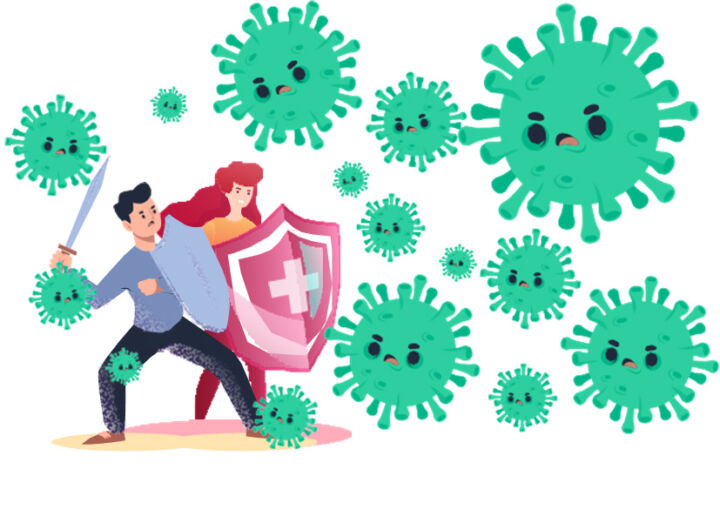Understanding and Strengthening Your Body’s Shield: The Immune System

Our bodies are constantly under attack from a barrage of microscopic invaders – bacteria, viruses, fungi, and parasites. Protecting us from these threats is the complex and vital network we call the immune system. Understanding how it works and how to support it is key to maintaining good health.
What is the immune system?
The immune system is a sophisticated network of organs, cells, and proteins that work in concert to defend the body against infection. Key players in this intricate system include:
| Immune System Players | Description |
|---|---|
| White blood cells | These are the sentinels of the immune system, constantly patrolling the body and neutralising invaders. |
| Antibodies | These proteins are produced by the immune system to specifically target and neutralise harmful substances (antigens). |
| Spleen | This organ filters blood, removing damaged or old blood cells and housing immune cells ready to respond to infection. |
| Bone marrow | This is where immune cells are produced. |
| Complement system | A group of proteins that enhance the ability of antibodies and phagocytic cells to clear microbes and damaged cells. |
| Lymphatic system | A network of vessels and tissues that transport lymph, a fluid containing white blood cells, throughout the body. |
| Thymus | An organ where T-cells, a type of white blood cell, mature. |

Why is the immune system so important?
Our immune system is essential for survival. Without it, we would be incredibly vulnerable to infections that could easily overwhelm our bodies. It is our primary defence against the constant threat of pathogenic microorganisms present ubiquitously in our environment.
How does the immune system work?
The immune system has two main branches:
| Innate immune system | This is the body’s first line of defence, providing a general, non-specific response to invaders. It acts quickly to fight and eliminate harmful substances. |
| Adaptive immune system | This system learns and adapts to specific threats. It recognises foreign substances and generates antibodies tailored to target them. Crucially, it remembers these encounters, providing immunity against future infections with the same or similar pathogens. |

Signs of a healthy versus a weak immune system
A healthy immune system is characterised by fewer and less severe infections. Individuals with strong immune systems tend to recover quickly from illnesses like the common cold or flu. Conversely, a weakened immune system is often indicated by frequent illnesses, prolonged recovery period, and more severe symptoms.
Lifestyle factors and immune health
The health of our immune system is closely tied to our overall well-being and metabolism. Several lifestyle factors play a significant role in maintaining optimal immune function:
Innate immune systemThis is the body’s first line of defence, providing a general, non-specific response to invaders. It acts quickly to fight and eliminate harmful substances.
| Stress | Chronic stress can weaken the immune system, making us more susceptible to illness. |
| Exercise | Regular moderate exercise can boost immune function. |
| Sleep | Adequate sleep is crucial for immune cell function and repair. |
| Nutrition | A balanced diet rich in essential vitamins and minerals is vital for a strong immune system. |

Lifestyle practices for immune support
Adopting healthy habits can significantly bolster your immune defences. These include:
 |
Eating a balanced diet |
 |
Regular physical activity |
 |
Getting enough sleep |
 |
Quitting smoking |
 |
Moderating alcohol consumption |

Immunity-boosting foods
Certain foods are packed with nutrients that support immune health:
 |
Beta caroteneFound in sweet potatoes, spinach, carrots, mangoes, broccoli, and tomatoes, beta carotene is a precursor to vitamin A, essential for immune function. |
 |
Vitamin CAbundantly found in citrus fruits, berries, melons, tomatoes, bell peppers, and broccoli, vitamin C supports cell repair and healing. |
 |
Vitamin DFound in fatty fish, eggs, and fortified milk and juices, vitamin D is important for healthy bones and teeth, and plays a role in immune regulation. |
 |
ZincFound in beef, seafood, wheat germ, beans, nuts, and tofu, zinc contributes to wound healing and immune function. |
 |
ProbioticsThese beneficial bacteria, found in yoghurt, kefir, and kimchi, promote gut health, which is closely linked to immune function. |
 |
ProteinFound in both animal and plant sources, protein is essential for producing antibodies and other immune components. |
By understanding the intricacies of the immune system and adopting healthy lifestyle practices, we can empower our bodies to effectively fight off infections and maintain optimal health. Remember, a strong immune system is a cornerstone of overall well-being.




